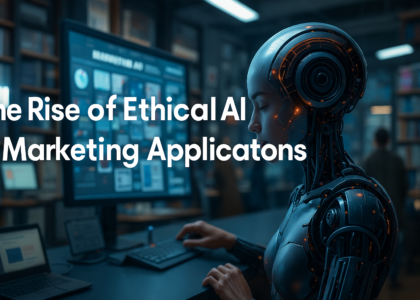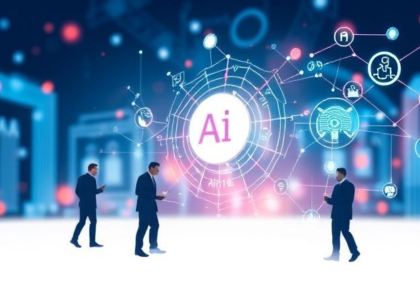In today’s digital-first world, consumers interact with brands through multiple touchpoints—be it social media, emails, websites, in-store visits, or mobile apps. For businesses to succeed, maintaining a consistent, unified experience across all these channels is essential. This is where omni-channel marketing shines. Omni-channel marketing involves integrating different channels to provide a seamless customer journey, regardless of the platform a consumer uses.
However, managing and orchestrating these channels effectively can be daunting, especially with the vast amounts of data generated by each touchpoint. This is where artificial intelligence (AI) enters the equation, transforming the landscape of omni-channel marketing by offering powerful solutions for personalization, customer engagement, and campaign optimization. As we step into 2024, AI is playing an even bigger role in defining how brands engage with customers through omni-channel strategies.
AI-Powered Personalization in Omni-Channel Marketing
One of the key benefits of AI in omni-channel marketing is its ability to provide highly personalized experiences. Consumers today expect more than just relevant products—they demand tailored experiences that cater to their unique preferences and behaviors. AI-driven tools enable brands to deliver such personalized experiences at scale.
1. Predictive Analytics for Enhanced Targeting
AI’s ability to process vast amounts of data enables brands to gain deep insights into customer behavior. Predictive analytics tools powered by AI analyze past consumer interactions to forecast future behaviors. This helps brands target customers with personalized messages, product recommendations, and offers at the right time, on the right platform.
For example, AI can predict which products a customer is likely to purchase based on their previous browsing and purchasing history. These insights can then be used to tailor marketing efforts, creating a more personalized and engaging experience for the customer.
2. Dynamic Content Generation
AI can also assist in dynamic content generation, where the content displayed on websites, emails, or mobile apps adapts in real-time to suit individual preferences. This could be as simple as showing personalized product recommendations or as complex as creating entirely unique landing pages based on a customer’s previous interactions.
In 2024, expect AI-powered platforms to offer even more advanced levels of customization, where algorithms continuously learn and adapt based on new data, providing ever-evolving content to keep customers engaged across all channels.
AI’s Role in Seamless Customer Journeys
Omni-channel marketing is all about providing a smooth, cohesive customer journey across multiple platforms. AI plays a critical role in stitching together these touchpoints, ensuring that transitions between channels are fluid and that customers receive a consistent brand experience.
1. Unified Customer Profiles
AI-powered customer data platforms (CDPs) are essential for building unified customer profiles. By collecting data from various sources—social media, email campaigns, in-store purchases, and more—AI creates a comprehensive 360-degree view of each customer. This unified profile enables brands to understand the customer’s journey, preferences, and pain points, allowing for more precise and effective marketing efforts.
For example, if a customer starts browsing products on a brand’s website and later abandons their shopping cart, AI can trigger an email reminder with the exact products the customer was considering. If the customer later visits the brand’s physical store, AI-powered systems can alert store associates to provide personalized assistance based on the customer’s online behavior, creating a seamless journey across digital and physical channels.
2. Cross-Channel Automation
AI-driven automation tools allow marketers to design workflows that automate customer engagement across multiple channels. From sending SMS notifications to delivering push notifications and emails at the most effective times, AI ensures that customers receive timely and relevant communications, no matter where they are in their journey.
In 2024, advanced AI systems will be able to optimize these workflows in real-time, adjusting strategies on the fly based on a customer’s behavior. This means that marketing teams can rely on AI to fine-tune campaigns, ensuring maximum engagement without manual intervention.
Chatbots and AI-Driven Customer Service
Customer service is a critical component of omni-channel marketing, and AI is revolutionizing how brands interact with customers in real-time. Chatbots and AI-driven customer service tools are becoming indispensable, allowing brands to offer instant support, 24/7, across various platforms.
1. Conversational AI for Real-Time Engagement
AI-powered chatbots are now capable of handling complex customer queries, thanks to advancements in natural language processing (NLP). These chatbots can engage customers in real-time, offering product recommendations, answering FAQs, or guiding users through a purchase journey.
For instance, if a customer interacts with a brand on social media, an AI chatbot can step in to answer queries, while the same chatbot can continue the conversation if the customer later visits the brand’s website. This ensures that customers receive consistent, personalized support, regardless of the platform they are using.
In 2024, we expect to see conversational AI evolving to become even more context-aware, allowing for smoother transitions between automated and human support, ensuring that complex queries are handled by customer service representatives when needed.
2. AI for Proactive Customer Service
AI doesn’t just wait for customers to ask for help; it can also predict when customers might need assistance and proactively reach out. For example, AI can detect if a customer is struggling to complete a purchase and trigger a chatbot to offer help. This proactive approach reduces friction in the customer journey and increases the likelihood of conversions.
Optimizing Omni-Channel Campaigns with AI
The power of AI lies in its ability to analyze data and continuously optimize campaigns for better performance. Omni-channel marketing involves juggling multiple platforms, audiences, and messaging strategies, and AI can streamline this complexity by automating and optimizing marketing efforts.
1. AI-Driven A/B Testing
A/B testing is a crucial part of optimizing any marketing campaign. AI can take this to the next level by automatically running multiple tests across various channels, analyzing the results, and implementing the most effective strategies. This allows marketers to experiment with different content, offers, and channels at scale, ensuring that the best-performing tactics are always in play.
2. Real-Time Campaign Adjustments
AI tools provide real-time insights into campaign performance. Instead of waiting until the end of a campaign to assess results, AI-powered platforms continuously monitor metrics like engagement, click-through rates, and conversions, making real-time adjustments to improve performance.
In 2024, we will see even more sophisticated AI systems that can autonomously optimize omni-channel campaigns in real-time, adjusting everything from budget allocations to content strategies based on performance data.
The Future of Omni-Channel Marketing in 2024 and Beyond
As we look ahead to 2024, AI’s role in omni-channel marketing will only continue to grow. With advancements in machine learning, NLP, and predictive analytics, AI will enable brands to deliver hyper-personalized experiences, optimize campaigns in real-time, and provide seamless customer journeys across all platforms.
Marketers who embrace AI in their omni-channel strategies will gain a competitive edge by delivering more relevant and engaging experiences, improving customer loyalty, and driving higher conversions. The future of omni-channel marketing is AI-driven, and those who leverage its potential will be well-positioned to succeed in an increasingly competitive digital landscape.
As AI continues to evolve, its influence on omni-channel marketing strategies will deepen, opening new avenues for innovation and efficiency. Here are a few ways in which AI will further transform omni-channel marketing in the near future:
1. Hyper-Personalization at Scale
Personalization has been at the heart of marketing for years, but AI takes this to unprecedented levels. By 2024, brands will be able to leverage AI to provide not only personalized content, but hyper-personalized experiences tailored to the exact needs and desires of individual customers in real time.
AI systems will analyze data points from a variety of sources—browsing history, purchase behaviors, social media interactions, and even contextual data like the weather or time of day—to provide highly relevant offers, messages, and product suggestions. Imagine walking into a store, and your mobile app instantly provides tailored discounts based on your online shopping activity, or an AI-powered system sending you a notification about a product you frequently view but haven’t yet purchased.
Moreover, hyper-personalization will extend beyond the traditional online channels into physical spaces. Retailers will increasingly use AI to integrate data from in-store purchases, social media, mobile apps, and websites to create a unified customer profile that adapts to both digital and offline experiences.
2. Augmented and Virtual Reality (AR/VR) Integration
AI-powered augmented reality (AR) and virtual reality (VR) are set to revolutionize omni-channel marketing. By combining AI with AR/VR, brands will be able to offer immersive, interactive shopping experiences. In 2024, we will see brands use AI to power AR filters that allow customers to visualize products in their homes before buying, or VR experiences that provide a virtual tour of a store from the comfort of their own living room.
AI will also enable marketers to track customer preferences during these interactions, delivering personalized product suggestions based on what the user is viewing or interacting with in these AR/VR environments. This adds a new layer to omni-channel marketing by creating engaging, hands-on experiences across digital platforms, while collecting valuable data to further enhance personalization.
3. Voice Search and AI-Driven Voice Assistants
Voice search is rapidly gaining popularity, and AI-driven voice assistants like Amazon’s Alexa, Google Assistant, and Apple’s Siri are becoming key channels in the omni-channel marketing mix. By 2024, voice search will play an even more critical role in customer journeys, as more people use smart speakers and mobile voice search to interact with brands.
AI-powered voice assistants can facilitate purchases, answer customer queries, and provide personalized product recommendations. As consumers increasingly rely on voice technology, marketers will need to optimize their omni-channel strategies to accommodate voice search. This means ensuring that websites are voice-search friendly, creating conversational content that resonates with voice queries, and designing voice-activated shopping experiences.
Moreover, AI-driven voice assistants will provide real-time, personalized responses based on customer data. For instance, a customer might ask their voice assistant for a restaurant recommendation, and based on past behavior and preferences, the AI can suggest options that align with the customer’s tastes and location.
4. Ethical AI and Data Privacy Considerations
As AI becomes more deeply integrated into omni-channel marketing strategies, ethical concerns surrounding data privacy, security, and bias will take center stage. With consumers growing increasingly aware of how their data is being used, businesses must navigate these concerns responsibly while delivering the benefits of AI-powered marketing.
In 2024, brands that can effectively balance AI-driven personalization with transparency and data privacy will gain a competitive advantage. AI can be used to ensure compliance with privacy regulations like GDPR and CCPA by offering more sophisticated methods of managing consent and ensuring that customers have control over their data.
AI will also help marketers avoid biases in data analysis and campaign optimization. For example, by using AI algorithms designed to reduce bias, brands can ensure that they’re not inadvertently excluding certain demographic groups from their campaigns or creating marketing messages that unintentionally alienate certain customers. In this sense, AI will not only drive better marketing results but also help brands build trust and credibility with their audiences.
5. AI-Enhanced Content Creation and Curation
While AI has traditionally been used to automate tasks like data analysis and customer segmentation, 2024 will see the rise of AI-generated content in omni-channel marketing. AI can assist in creating personalized copy for email campaigns, social media posts, product descriptions, and more.
Natural language processing (NLP) models will become even more advanced, enabling AI systems to generate content that resonates with specific audiences based on their preferences and behaviors. AI will be able to create unique, tailored messaging for each customer across various platforms, from personalized email campaigns to dynamic social media ads, ensuring that the right message reaches the right person at the right time.
AI will also play a role in curating content from multiple sources and presenting it in ways that align with individual customer preferences. For example, AI algorithms can curate user-generated content, customer reviews, or influencer posts that are most relevant to a particular audience segment, and present this content across various channels to drive engagement.
6. AI and Blockchain for Enhanced Data Security
AI, when combined with blockchain technology, can offer enhanced security for omni-channel marketing strategies. Blockchain’s decentralized and transparent nature allows businesses to ensure that customer data is stored securely and that interactions between different platforms are fully traceable. AI, on the other hand, can help manage and interpret the data, offering insights that can enhance marketing strategies while maintaining customer trust.
In 2024, expect more brands to use AI-powered blockchain systems to protect customer data and maintain transparency in how that data is being used. This will be especially important as consumers become more aware of the risks of data breaches and demand more control over their personal information.
Conclusion: The Future of AI-Driven Omni-Channel Marketing
The role of AI in omni-channel marketing is expanding rapidly, and 2024 will mark a significant leap forward in how brands interact with consumers across multiple platforms. From hyper-personalized experiences to voice search optimization and AI-driven content creation, the possibilities are endless.
As AI technologies continue to evolve, marketers must stay ahead of the curve by embracing AI’s potential to deliver seamless, data-driven, and personalized experiences. Those who integrate AI into their omni-channel marketing strategies will be able to create cohesive customer journeys that span digital and physical touchpoints, driving higher engagement, loyalty, and ultimately, revenue.
However, success in AI-driven omni-channel marketing will require more than just technological adoption. Brands will need to prioritize ethical considerations, data privacy, and transparency while maintaining a customer-first approach. In doing so, businesses will not only thrive in an increasingly competitive landscape but also foster lasting relationships with their customers—ensuring that they remain at the forefront of innovation and customer satisfaction as we move further into the AI-powered future.




